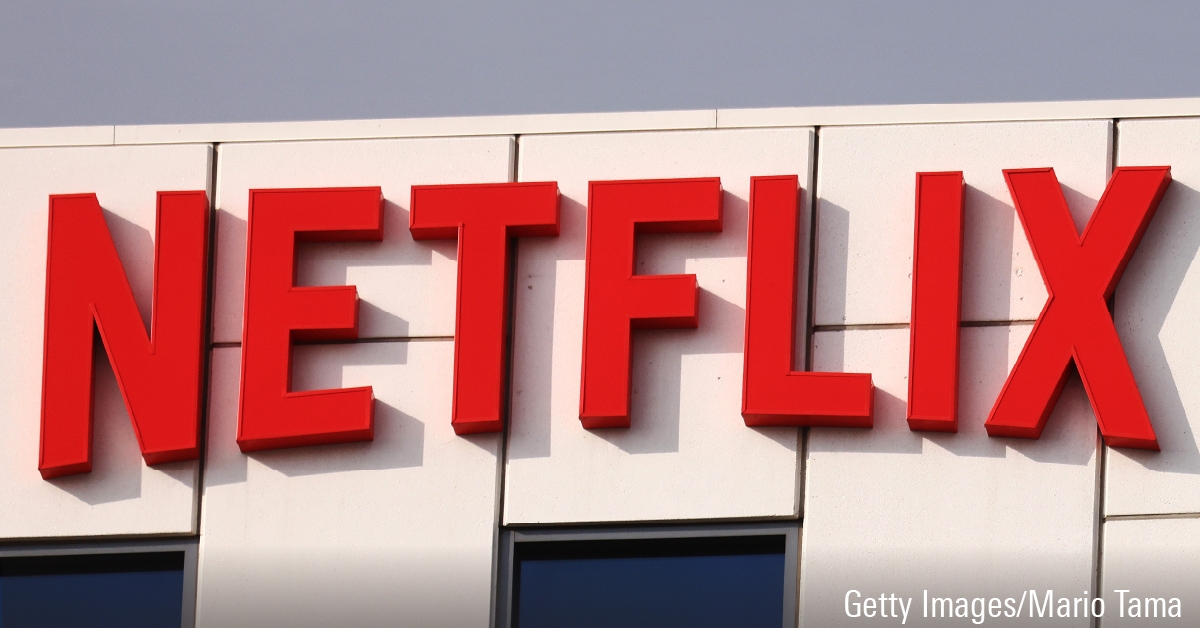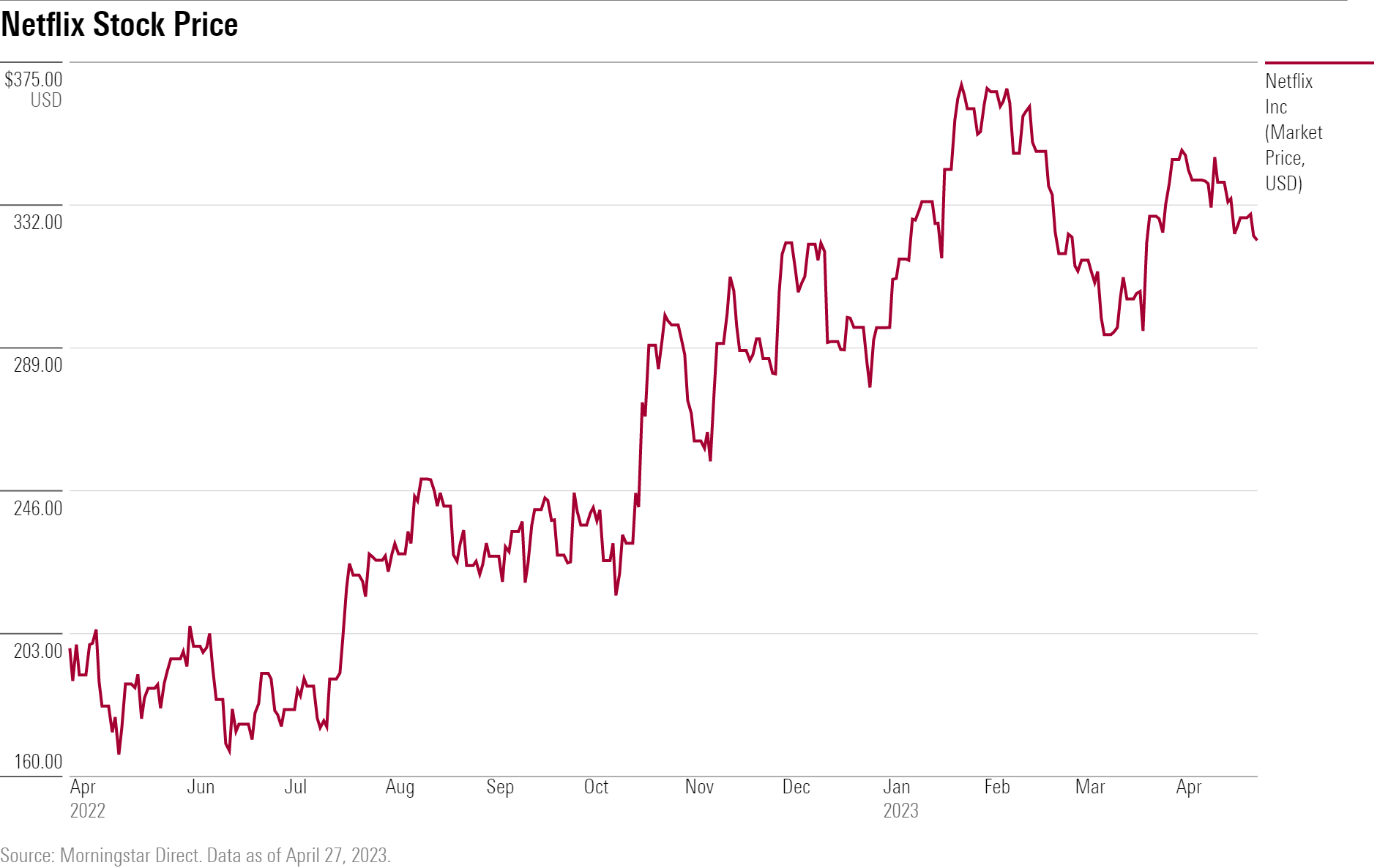Is Netflix Stock a Buy, a Sell, or Fairly Valued After Earnings?
Netflix looks to expand its original content marketing to get ahead of competitors.

Netflix NFLX released its first-quarter earnings report on April 18. Here’s Morningstar’s take on how investors should view Netflix’s earnings, the company’s long-term outlook, and Netflix stock.
Key Morningstar Metrics for Netflix
- Fair Value Estimate: $315
- Morningstar Rating: 3 stars
- Morningstar Uncertainty Rating: Very High
- Morningstar Economic Moat Rating: Narrow
Fair Value Estimate for Netflix
With its 3-star rating, we believe Netflix stock is fairly valued when compared with our fair value estimate.
Our updated fair value estimate of $315 per share assumes that Netflix’s domestic paid streaming subscriber count expands only slightly to 76 million in 2027. Price elasticity plays a major role in our estimates. In general, we are skeptical of the claim that pricing increases won’t harm customer counts globally. Our domestic subscriber and pricing forecast generates 6% average annual revenue growth between 2023 and 2027, as Netflix benefits from price increases every 18 months. We expect that increased revenue from the crackdown on password sharing will be somewhat offset by increased churn and that the lower-priced ad-supported tier in the United States will largely take subscribers from the traditional basic plan. We expect management to continue investing in content and marketing, weighing on overall margin expansion. Overall, we forecast average revenue growth of 9% for Netflix, with the operating margin expanding to 25% in 2027 from 21% in 2021 after dipping to 18% in 2022.
Read more about Netflix’s fair value estimate.
What We Thought of Netflix’s Q1 Earnings
- We would characterize the earnings as mixed. The firm pushed out some monetization initiatives like paid sharing until the second quarter, and the subscriber growth was muted. Second-quarter subscriber guidance similar to the first quarter was disappointing to bulls.
- Our rating on the stock is 3 stars, and we think the earnings are in line with that. The competition in the U.S. remains tough, and subscriber growth will be challenging. There are similar issues in Asia-Pacific. While the company didn’t release subscriber numbers for the new ad-supported plan, the commentary around the per-subscriber pricing was promising and offers some succor for bulls.

Economic Moat Rating
We assign Netflix a narrow moat rating. Netflix is the largest subscription video on demand provider in the U.S. and is rapidly expanding internationally. This new content not only strengthens its relationship with its current customers but also attracts new customers via word of mouth and the halo effect from critical acclaim and award nominations. Through the streaming video delivery method, Netflix tracks every customer interaction, from large (total time spent at Netflix) to minute (whether a user pressed fast-forward). The average Netflix user worldwide now watches more than 90 minutes of video per day. Netflix leverages this dataset across its offerings in multiple ways to derive durable competitive advantages. To improve the customer experience, Netflix analyzes data traffic, video performance, and buffering to better understand where data loss and slowdown occurs and route traffic accordingly. Netflix also leverages its cloud database to help with its content creation and acquisition efforts as well as to run its content discovery engine.
Read more about Netflix’s moat rating.
Risk and Uncertainty
The move to relying on original content has added costs and risks. Netflix now depends heavily on its ability to find and create compelling new original programming with relatively tight schedules on an ongoing basis. If this pipeline falters, subscribers could bolt to competitors. Netflix’s expansion outside the U.S. could continue to drag on margins because of different tastes and lower pricing. Increasing the subscription price in mature markets could limit growth and increase churn. While the introduction of ads could help Netflix attract and increase revenue from price-sensitive consumers, the new offering could also dilute the firm’s brand equity with users. By offering service in almost every major country save China, Netflix is exposed to numerous regulatory regimes around content restrictions, content production, and taxation.
Read more about Netflix’s risk and uncertainty.
NFLX Bulls Say
- Netflix’s internal recommendation software and large subscriber base give the company an edge when deciding which content to acquire in future years.
- Netflix has built a substantial content library that will benefit the firm over the long term.
- International expansion offers attractive markets for adding subscribers.
NFLX Bears Say
- The firm continues to burn billions of dollars of cash to create its original content, with no end in sight.
- The level of competition in the U.S. and internationally is increasing and will continue to do so over the near future. Disney+ launched its own branded SVOD service in the second half of 2019.
- The need for increased content and marketing spend outside of the U.S. will limit the rate of margin expansion for the international segment.
Get access to full Morningstar stock analyst reports, along with data and tools to manage your portfolio through Morningstar Investor. Learn more and start a seven-day free trial today.
The author or authors do not own shares in any securities mentioned in this article. Find out about Morningstar’s editorial policies.

/s3.amazonaws.com/arc-authors/morningstar/fab4d3e1-7951-4575-a38d-fd2028ad4ae3.jpg)
/cloudfront-us-east-1.images.arcpublishing.com/morningstar/ECVXZPYGAJEWHOXQMUK6RKDJOM.jpg)
/cloudfront-us-east-1.images.arcpublishing.com/morningstar/KOTZFI3SBBGOVJJVPI7NWAPW4E.jpg)
/cloudfront-us-east-1.images.arcpublishing.com/morningstar/V33GR4AWKNF5XACS3HZ356QWCM.jpg)
:quality(80)/s3.amazonaws.com/arc-authors/morningstar/fab4d3e1-7951-4575-a38d-fd2028ad4ae3.jpg)